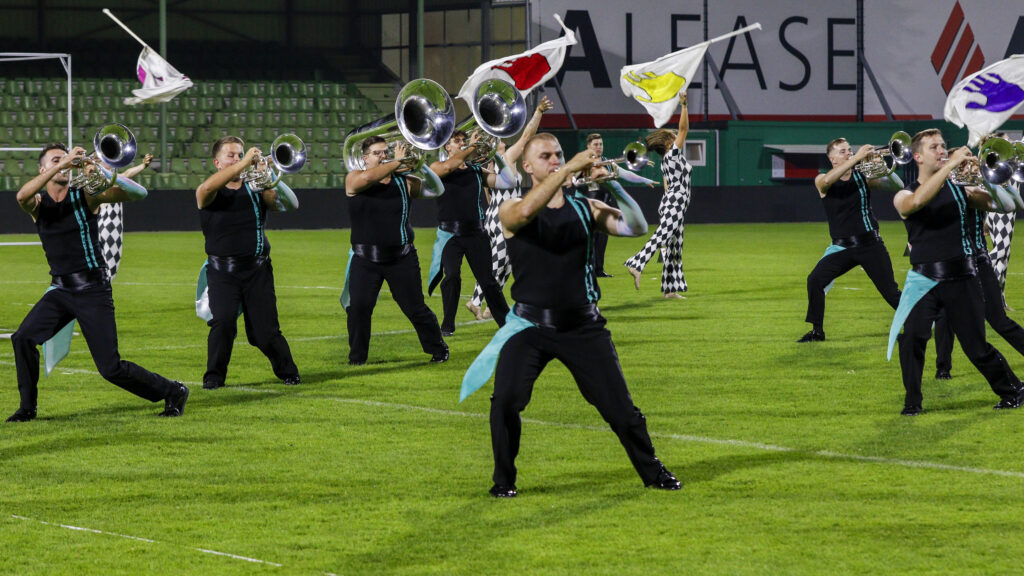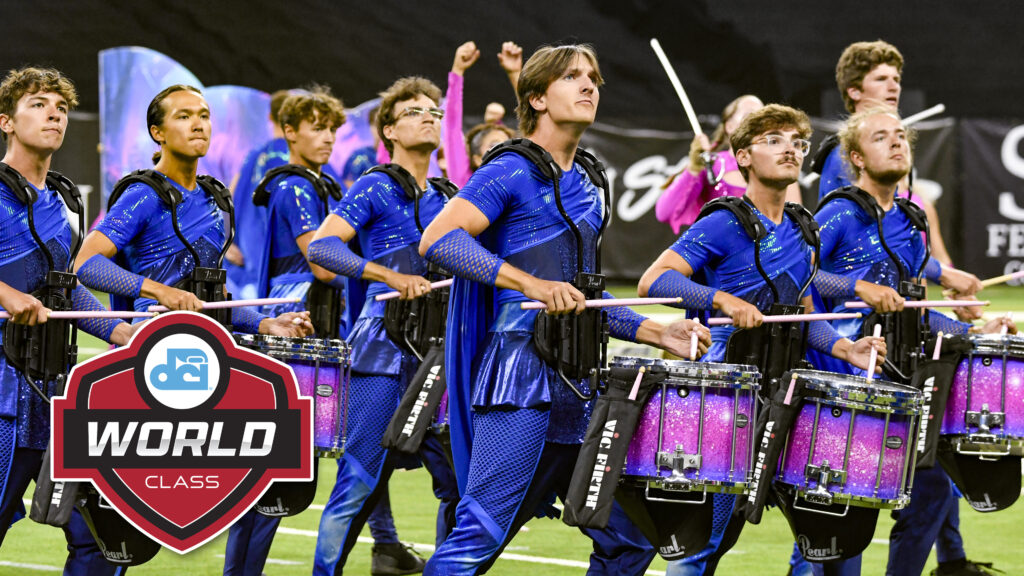
Scott Ward marched with the Argonne Rebels from 1971 through 1976. He responded to the Fanfare column, “Wonders of Drum Corps: The Readers Respond” (June 27, 2003). By the way, all are welcomed to respond to various columns with submissions of their own. (Hint, hint.) Here’s what Scott had to say. I was reading through the comments regarding the wonders of drum corps. And thought I would add my thoughts to your list. Sandra Opie, horn line instructor of the Argonne Rebels (Great Bend, Kan.) should top the list. No one could inspire a group of young people to want to achieve such perfection. And perfection they achieved under her expert guidance and direction. There was no gray area with Sandra. It was either right or wrong, with no in between. Remember, this was the age of the “tick” system! And at a time when young men dominated the field. One of Sandra’s gifts was instilling in every member of Argonne the desire to achieve their very best. Each member had such an incredible desire to meet her exacting standards. Recordings of the Argonne Rebels from the late 1960s and early 1970s prove my point. Where some other corps performed watered down scores, Sandra pushed for arrangements true to the composers’ intent. No horn line sounded better or could execute a more difficult score. Sandra pushed the envelope. Drum corps wouldn’t be what it is today without her immeasurable contribution both as a brass instructor and later as a DCI judge. No one (in my opinion) deserves greater recognition than Sandra and her husband Glenn. As you know, both were involved with Argonne for many years, Sandra from 1959 through 1973. I was lucky to be a member of the Argonne horn line in the early 1970s. Yes, Sandra did give private lessons throughout the year. Brian Pennington, who assisted her, also deserves recognition. I received brass instruction from Brian. I was not able to have private instruction from Sandra, as there were simply not enough hours in the day and too many kids for her to tutor. Not until the corps season began. Then everything changed. Sandra was a remarkable mentor and a terrific teacher. She had this ability to inspire confidence in her “students.” She made you want to excel. She actually had a way of demanding it … and didn’t give up until she got it. But, for me, it was never anything but sheer joy. She also was extremely humble and gave credit to the “kids.” You simply wanted to get it right when you were in her presence! And usually, you did because she had taught you how to do what needed to be done. Some of the scariest times of my young life were when she would have each of us play a passage individually. You simply didn’t want to disappoint her! Sandra would go to bat for us with the judges defending our ability and our performances as well. She was a fighter and a leader. She just didn’t take “no” for an answer. I also remember many times on national tours, members of the horn lines of Santa Clara, Garfield Cadets, Blue Rock, Blue Stars and some of the other great corps of the era would come to hear us rehearse. At those times, we knew we were a part of something very special. We were indeed privileged to be lead by such a wonderful and gifted instructor. When I remember that all of this came out of a small Kansas town of 18,000 people, it amazes me. As I recall, in 1973, Argonne took first in horns in the prelims at DCI … and did it with something like 23 or 24 young women in the horn line! Yes, at the peak, the Argonne horn lines were unstoppable! Sandra and Glenn deserve so much recognition for giving so many gifts to so many kids from Great Bend and the surrounding area. They were my first mentors and the gifts they gave have lasted a lifetime. After the end of the 1973 season, I returned to high school. Sometime during the year, I received a letter from the Argonne camp disclosing that Glenn and Sandra were retiring from the corps. I was crushed. I’m sure many other members of the corps felt the same. It was like losing something very rare and dear. I was depressed for months. As I reflect back on those days, I understand that both Sandra and Glenn needed a break. They had young children to raise and other interests to pursue. Producing a championship drum corps was a lot of work. However, after Sandra and Glenn left Argonne (at the end of the 1973 season), I was fortunate to still be guided by their unwavering commitment to the youth of Great Bend … and certainly to me! I lived just down the street from where Sandra and Glenn lived. They had purchased a home that my great grandfather built on the opposite end of the block. The home is quite large and is a stucco structure. As a way of helping me finance my college education, Sandra and Glenn hired me to paint the exterior of that house. I felt so honored. I probably would have done it for free. Even in that endeavor, Sandra guided me with great care. She taught me how to strip the paint away and how to do the job correctly. I remember being on a scaffold outside the kitchen window and working away. Please understand, I was working on the home of my first mentor. I didn’t want to screw this up! Sandra was a stickler for doing things right. If things weren’t done right, you really shouldn’t do them at all. You just didn’t do anything without conviction and determination. It wasn’t her style. I always felt this sense of awe around Sandra. It bordered on fear but I don’t really think it was fear, because you knew she had great concern and love for those under her direction. We were her “kids.” It was more a feeling of wanting to be near her to learn the lessons that you just knew you could learn if you paid attention. You just knew you were surrounded by something remarkable. And if you paid enough attention or were in that “light” long enough, some of it might land on you. She had precious gifts to bestow on all of us and she gave them so freely. So, here I am on this scaffold, painting the kitchen window. Suddenly, the window opens and Sandra asks for the brush from my hand. She then delicately paints a spot of the window frame that I had missed and returns the brush to my hand. Glenn (an attorney) even volunteered to prepare my income taxes! He completed that task for several years until I left Great Bend for college. These two remarkable people gave so much of themselves to so many kids from Great Bend and Barton County. They helped put Great Bend on the map. They gave all of us something to be proud of. They galvanized a community. They gave the kids something to aspire to. This was a small Kansas town and for many kids, there were not a lot of opportunities outside the school system. But Glenn and Sandra helped us learn so many valuable life skills. I use the lessons they taught us every day. When you were in their presence, you felt good. They gave me the precious gift of self-esteem. They taught me to believe in and fight for what was right. They guided all of us to something better than we might have been without their tutelage. They gave us opportunities to excel. They are remarkable and inspiring individuals who will always have a very special place in my heart. One of the memories I have of Glenn is his running shoes that always appeared to be turned up at the toes. He was a track star in high school (I learned that from my father who was a high school friend of his), and (I believe) to this day, Glenn continues to run relay races with “seniors” across the state. My mother tells me that she still sees him running his two dogs by the house just about everyday. I wasn’t able to attend the Argonne reunion last year, but I believe if you look at the photographs on the Web site, you may see Glenn in running shoes that are turned up at the toes. That image in my mind always puts a smile on my face. I remember seeing Sandra run across the practice field with one of her two young children clutched in one arm and nudging someone into line. I’m sure that it must have been quite a challenge to hold on to a toddler and teach us how to play some of those difficult arrangements! In 1971, Sandra taught us how to march in 7/8 time during “Heaven on their Minds.” That was a challenge. Those drills were extremely difficult. Think of the end of “Barnum and Bailey’s Favorite.” As I recall, every member of the corps — something like 110 members — were in one line across the field. There was a lot of exposure in those shows. This was before all of the arcs and curves that came in later years. Sandra was always watching us to make sure we were in line. Occasionally, you might feel her nudge you into place. It might scare you to death as you would be singled out but you also knew it was done with extreme care and encouragement. She wasn’t above coming after you to get your feet up when you were marking time … up to the knees! Of course there were many, many hours spent in sectionals. That is where we really got the individual attention. She drilled us during those sessions. I think that’s where I really learned how to play a brass instrument. She used to take a bugle and play a passage for us. She would exaggerate it. I can still hear her voice in my head vocalizing how to tongue a difficult passage, demonstrating exactly where she wanted the tongue to hit the roof of the mouth. You might be playing something and it just didn’t have the power she wanted. She went for this very full and round sound that wasn’t easy to achieve out of a one-piston, one-valve bugle. It became the sound every drum corps tried to emulate. So, if she didn’t think you were giving enough or she wanted more from you, she might very delicately push your stomach. She was teaching us how to breathe from the diaphragm. She was also a stickler for making sure we had a correct embouchure. You just couldn’t play muddy in her presence. It had to be clean and round and full and precise, but with so much emotion. I had a girlfiend who used come watch us practice. I don’t know if you will remember, but at the end of “John Nineteen, Forty-one, (from the rock opera “Jesus Christ Superstar,”) the horn line would ever-so-slightly bow… Argonne 1971-1976





